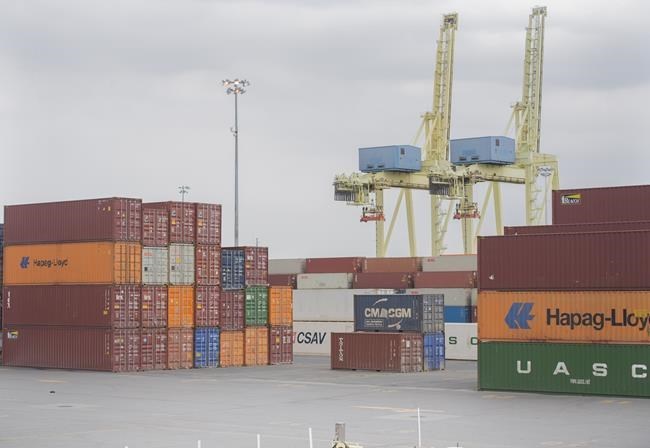MONTREAL — The union representing dockworkers at the Port of Montreal says it has ended a long-standing hiring practice that has been criticized for fostering nepotism — to the point where workers' preschool offspring were placed on a list of potential employees.
For decades, the association of shipping companies that use the port has hired longshore workers from a list supplied by the union — a list created by asking each union member to provide a single name.
But the Maritime Employers Association has argued the list is a recipe for nepotism, resulting in few women candidates or members of ethnic minorities, but in some instances children who were barely out of diapers.
In April, a labour arbitrator ordered a series of changes after finding it was impossible for people to get their names on the list unless they were related to current dockworkers.
"It appeared that this list contained, almost exclusively, the names of family members of each of the longshore workers, without any verification of merit or the ability of these people to do the job of a longshore worker," Nathalie Faucher wrote in her decision. She found that the list amounted to employment discrimination based on family situation, which is banned under federal human rights law.
In another decision on the matter last year, Faucher had noted the employer's contention that "certain candidates appearing on the union's master list are currently children under three years of age."
Since 2015, 50 per cent of longshore workers have been hired from the union's list — previously all hires were drawn from the list.
Faucher found that while the process has faced criticism since the early 1980s, previous attempts to change the system resulted in long conflicts. "Strong measures will have to be taken to break this cycle of systemic discrimination," she wrote.
The Canadian Union of Public Employees-affiliated union had argued no questions were asked about the relationship between the person being added to the list and the member proposing them, so it was unaware of any family links. However, Faucher found those links were often self-evident.
The union also claimed the association's challenge to the list was an attempt to short-circuit upcoming contract negotiations.
Spokesman Michel Murray said the union is fully respecting the arbitrator's April decision, which ordered it to take more than a dozen steps to make it possible for anyone qualified to get their name on the list. The arbitrator also appointed an independent monitor to ensure her orders were being respected.
Murray said the list goes back decades "to when active longshore workers were asked by shipping companies to have their family members join the workforce when the Port of Montreal was busy."
Because each worker could put only a single name on the list, "it was not uncommon for minors to be listed, given that it could take several years before the employer issued a call for applications," he wrote in an email Tuesday.
The Maritime Employers Association said it's not questioning the union's prerogative to choose workers — but the process must comply with human rights law and the collective agreement.
"We are obviously pleased with the arbitration decision in the nepotism case. Inclusion, equality and accessibility for all are important values for the MEA," said Isabelle Pelletier, the association's vice-president of communications and public affairs.
John Corey, the president of the Freight Management Association of Canada, said that like other publicly traded companies, large shipping companies have to report on diversity and governance in their financial statements.
"They have an obligation to report on those issues to their shareholders, so it makes it much more difficult for a company to say, we're just going to hire friends and relatives. Times have changed," he said in an interview Wednesday.
Pier-Luc Bilodeau, an industrial relations professor at Université Laval, said systems in which employers hire candidates selected by unions have existed at other North American ports, as well as for stagehands and in the construction industry — though the practice has been banned in Quebec's construction sector.
"As a group we want to make sure that the generation after us, our children, can have this opportunity to have good jobs — that's the logic behind the union's approach," he said in an interview Wednesday.
While the presence of young children on the list may seem shocking, it follows that same logic — union members don't know when more workers will be needed and want to ensure their children are near the top of the list when they are able to fill jobs at the port.
Jean-Claude Bernatchez, a professor of labour relations at the Université du Québec à Trois-Rivières, said the organization of work at the Port of Montreal will likely be one of the central issues as the union begins negotiations with the MEA on Thursday.
"The unions want to keep the number of jobs they have in Montreal. There's something like 1,400 longshore workers and they want to keep their wages, they want to keep their methods, so they're resistant to change," he said. "As for the employer, they want to reduce their costs, they want to introduce technology as much as possible to make things more efficient."
This report by The Canadian Press was first published Sept. 14, 2023.
Jacob Serebrin, The Canadian Press



